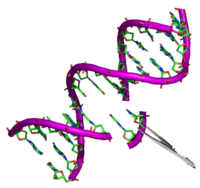
Photo from wikipedia
Fifteen samples of whey protein concentrate (WPC) were tested against 37 commercial Streptococcus thermophilus strains to detect infective bacteriophages. Seventy-three diverse phages were isolated from 12 samples, characterized by using… Click to show full abstract
Fifteen samples of whey protein concentrate (WPC) were tested against 37 commercial Streptococcus thermophilus strains to detect infective bacteriophages. Seventy-three diverse phages were isolated from 12 samples, characterized by using DNA restriction patterns and host range analyses. Sixty-two of them were classified as cos, two as pac, and nine as 5093, according to PCR multiplex assays. Phage concentration was greater than 104 PFU/g for 25.3% of isolated phages. Seven phages showed an unusual wide host range, being able to infect a high number of the tested strains. Regarding thermal resistance, pac phages were the most sensitive, followed by cos phages, those classified as 5093 being the most resistant. Treatments at 85 °C for 5 min in TMG buffer were necessary to completely inactivate all phages. Results demonstrated that the use, without control, of these whey derivatives as additives in dairy fermentations could be a threat because of the potential phage infection of starter strains. In this sense, these phages constitute a pool of new isolates used to improve the phage resistance of starter cultures applied today in the fermentative industry.
Journal Title: Viruses
Year Published: 2022
Link to full text (if available)
Share on Social Media: Sign Up to like & get
recommendations!